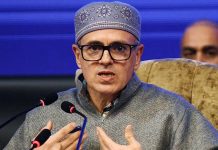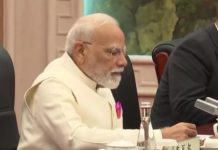Sehrai’s death in custody could impact Indo-Pak back-channel dialogue, reports RIYAZ WANI

The death in police custody of the top Hurriyat leader Mohammad Ashraf Sehrai, 80, has shaken the separatist camp in Kashmir Valley. It has also generated an undercurrent of resentment among a large section of population, reinforcing a sense of deep persecution being felt by the people since the revocation of Article 370 in August 2019. Sehrai was the chief of Tehreek-i-Hurriyat, the separatist outfit headed before him by the major separatist leader Syed Ali Geelani. He had also been the lifelong confidante of Geelani.
Ten days prior to his death, in a phone conversation with his son Raashid Ashraf Khan, the ailing Sehrai had complained about the jail authorities not providing him medical treatment. “I am ill, have grown weak, feel dizzy and cannot move. The jail authorities are not providing me any treatment,” Sehrai is said to have told Khan.
In March 2018, Sehrai had succeeded Geelani as the new chief of Tehreek-i-Hurriyat. This was the first time that the leadership of any party had changed hands in the separatist political camp, a development of profound significance as it was Geelani himself who had made the way for one.
Sehrai was a decade younger than Geelani and also was the senior-most after his mentor. The two had been together since 1959 when Geelani brought Sehrai from his village in Kupwara to head a madrassa in Sopore, Geelani’s hometown. And more importantly, the two were ideologically aligned, seeking merger of Kashmir with Pakistan through the implementation of United Nations Resolutions. Both clambered through the ranks in the politico-religious outfit Jamaat-e-Islami. But in 2004, the two split from Jamaat after the outfit refused their request to play a more active role in the separatist movement and founded Tehreek-i-Hurriyat.
A year earlier, Geelani had broken away from the then Hurriyat Conference and formed an alternative alliance of the separatist parties called Hurriyat G (Geelani). Here again, Sehrai was with him. But all his life, Sehrai had preferred to work under Geelani’s shadows and it was only when he was made Tehreek-i-Hurriyat chief that he briefly stepped out into the limelight. And in his first statements, he did not shy away from asserting his leadership and making some bold statements about the prevailing situation in the then state.
For example, Sehrai was forthright in his condemnation of the ISIS and Al Qaeda, saying Kashmir had nothing to do with any organization plying a global agenda. “Daesh (ISIS) and Al-Qaida have nothing to do with our movement and we will never accept them,” Sehrai said. “Those raising ISIS flags are strengthening the roots of occupation in Kashmir. These youth tell the world that we are extremists and deserve to be killed”.
He even took a position against slain Zakir Musa, the then chief of Ansar Gazwat-ul-Hind, an Al Qaeda affiliate. “Zakir Musa is the light of my eyes. He left everything for the sacred cause. But I want to tell him that by moving towards extremism he was doing India a favour.”
The death in custody of Sehrai is also likely to impact the fledgeling re-engagement between India and Pakistan. According to senior officials from Pakistan, the two neighbours have been engaged in back-channel talks since December last year, leading to the two sides re-affirming 2003 ceasefire agreement along Line of Control in February. Pakistan prime minister Imran Khan has also expressed his deep dismay at Sehrai’s passing away.
“Deeply saddened by demise of Kashmiri leader Ashraf Sehrai in illegal Indian custody. India’s oppression of Kashmiris is a blot on int community’s collective conscience. We will continue to support Kashmiris’ just struggle for right to self-determination in accordance with UNSC Resolutions,” Khan tweeted soon after Sehrai’s demise.
It remains to be seen whether the development will impact the ongoing back-channel dialogue.
tehelkaletters@gmail.com












